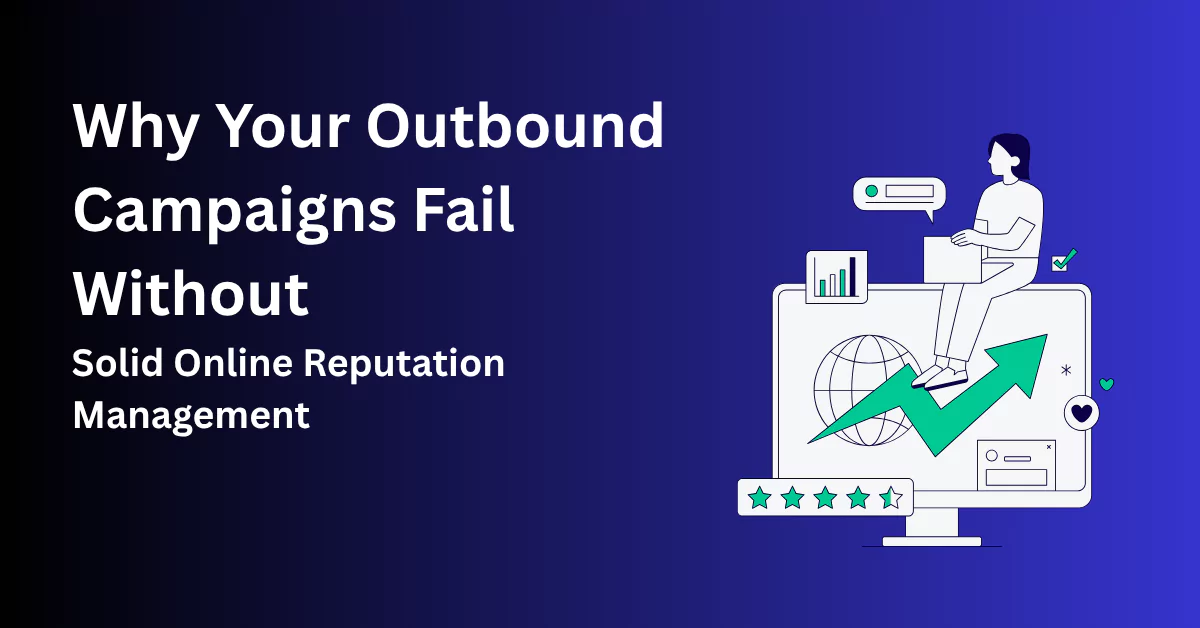When was the last time you searched for a business online before interacting with them? Chances are, you’re not alone. Over 90% of people research a business online before engaging with it. Now imagine launching outbound campaigns that drive potential customers to Google your brand, only for them to find negative reviews, poor search results, or no presence at all. Without solid online reputation management, your outbound campaigns can fall flat, costing you leads, trust, and revenue.
This blog unpacks why reputation management is the backbone of successful outbound marketing and how you can ensure potential clients see your best side.
Why Reputation Management Matters in Outbound Marketing
Outbound marketing campaigns are designed to grab attention and drive potential customers to take action. Whether you’re sending cold emails, running ads, or making calls, your goal is to spark interest. But the moment that interest is piqued, your online reputation becomes the deciding factor.
Here’s why it matters so much for outbound campaigns:
- First Impressions Happen Online
Once someone receives your cold email or clicks on your ad, their next logical step is to research your company online. A quick Google search will tell them everything they think they need to know. If the first thing they see is negative reviews, outdated search results, or a poorly managed website, they’re unlikely to proceed further.
- Trust is the Currency of Conversion
Consumers trust businesses with strong online reputations. According to a survey by BrightLocal, 76% of people trust online reviews as much as recommendations from friends. If your online presence lacks trust signals like positive reviews, testimonials, and active social media, your outbound efforts could seem untrustworthy.
- Reputation Complements Messaging
Your outbound messaging may promise high-quality service or unparalleled expertise, but does the digital trail back it up? Misalignment between what you promote in your campaigns and what your online reputation reflects can create distrust and confusion.
The Common Problems Businesses Face Without Reputation Management
1. Negative Reviews Dominate Search Results
Unmanaged online reviews can be the Achilles’ heel of even the most well-intentioned outbound campaign. A study by ReviewTrackers found that 94% of people said a bad review convinced them to avoid a business.
Example:
Imagine you send out an outbound campaign offering free trials of your SaaS product, only for prospects to find scathing feedback about poor customer service. That promising lead just turned into a dead end.
2. Lack of Recent Activity on Social Media
Inactive or outdated social media profiles are red flags for potential customers. They may perceive your business as unprofessional or question its legitimacy.
Example:
You send LinkedIn messages as part of your campaign, but when prospects check your company’s page, they see the last post was a year ago. This lack of engagement can erode trust and credibility.
3. Google Rankings Don’t Favor Your Business
If your company doesn’t rank on the first page of Google for your brand name, people might never find you. Worse still, they may stumble upon competitors offering similar products or services.
Example:
After receiving an outbound email, a prospect searches for your business name plus “customer reviews.” The top result? A third-party review site filled with complaints and outdated information.
4. Confusing or Outdated Branding
If the branding on your website, reviews, or social media doesn’t match the messaging in your outbound campaign, it can create a disconnect. Prospective customers may question the authenticity of your business or simply lose interest.
How to Strengthen Your Online Reputation
To ensure your outbound campaigns don’t fail due to reputation issues, you must proactively manage how your business appears online. Here’s how to do it effectively.
1. Audit Your Online Presence
Before launching any outbound campaign, conduct a thorough audit of your online presence. Search for your business name on Google, check the first two pages of search results, and evaluate your reviews on platforms like Google, Yelp, and Trustpilot.
- Action Step: Create a list of issues you find during the audit, whether it’s negative reviews, outdated information, or poorly ranking pages.
2. Proactively Manage Online Reviews

Encourage happy customers to leave positive reviews and address negative feedback promptly. How you handle criticism can be just as important as the reviews themselves.
- Action Step: Reach out to satisfied clients asking for reviews, and always respond to negative comments with professionalism and a solution-focused approach.
3. Invest in SEO for Branded Search Queries
Do your business name, “reviews,” or key services show up prominently in Google search results? If not, invest in local SEO, content marketing, and backlink strategies to improve visibility.
- Action Step: Publish content like case studies, blog posts, or press releases that highlight your expertise and push positive links higher in search rankings.
4. Bring Consistency to Branding
Ensure that your website, social media profiles, and online listings all reflect the same branding and messaging. Prospective customers should get a unified view of your business regardless of where they look.
- Action Step: Regularly update your social media profiles and website to align with your outbound campaign messaging.
5. Monitor and Improve Regularly
Reputation management isn’t a one-and-done task. Continuously monitor your online reputation using tools like Google Alerts, Mention, or Brand24, and take action as needed.
- Action Step: Dedicate a team or hire an agency to monitor conversations about your brand and act on insights.
Real-Life Examples of Reputation Management Impact
Example 1:
A software company noticed its outbound campaigns weren’t converting despite a solid offer. Upon investigation, they found their Trustpilot page was riddled with negative reviews about a slow onboarding process. They addressed the feedback by improving onboarding and responding to reviews. Within three months, conversion rates from outbound campaigns increased by 45%.
Example 2:
A fitness studio launching a cold email campaign discovered that their branded Google search results led to an old address and outdated class schedules. By cleaning up their listings and improving their website SEO, they saw a 50% increase in prospects visiting their site after receiving emails.
Build Trust, Win Campaigns
Your online reputation is your business’s first impression, and there’s no second chance to make it right. Successful outbound campaigns don’t just rely on compelling copywriting or irresistible offers; they’re backed by a strong online presence that builds trust and credibility.
While it may require upfront time and effort, investing in robust reputation management ensures your campaigns don’t just lead to clicks but conversions.
Want to make sure your campaigns thrive? Start auditing your online presence today, and take proactive steps to enhance your reputation.





